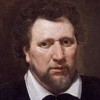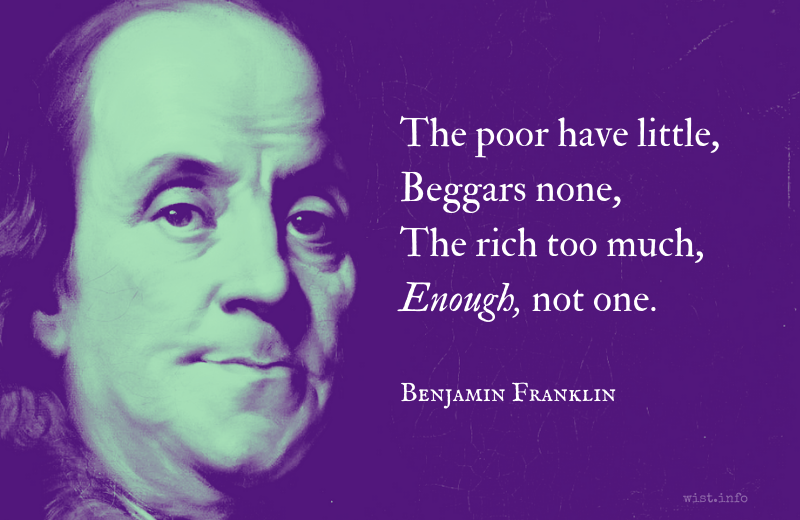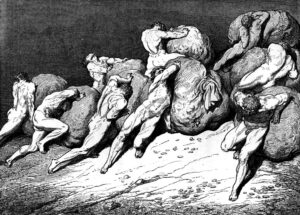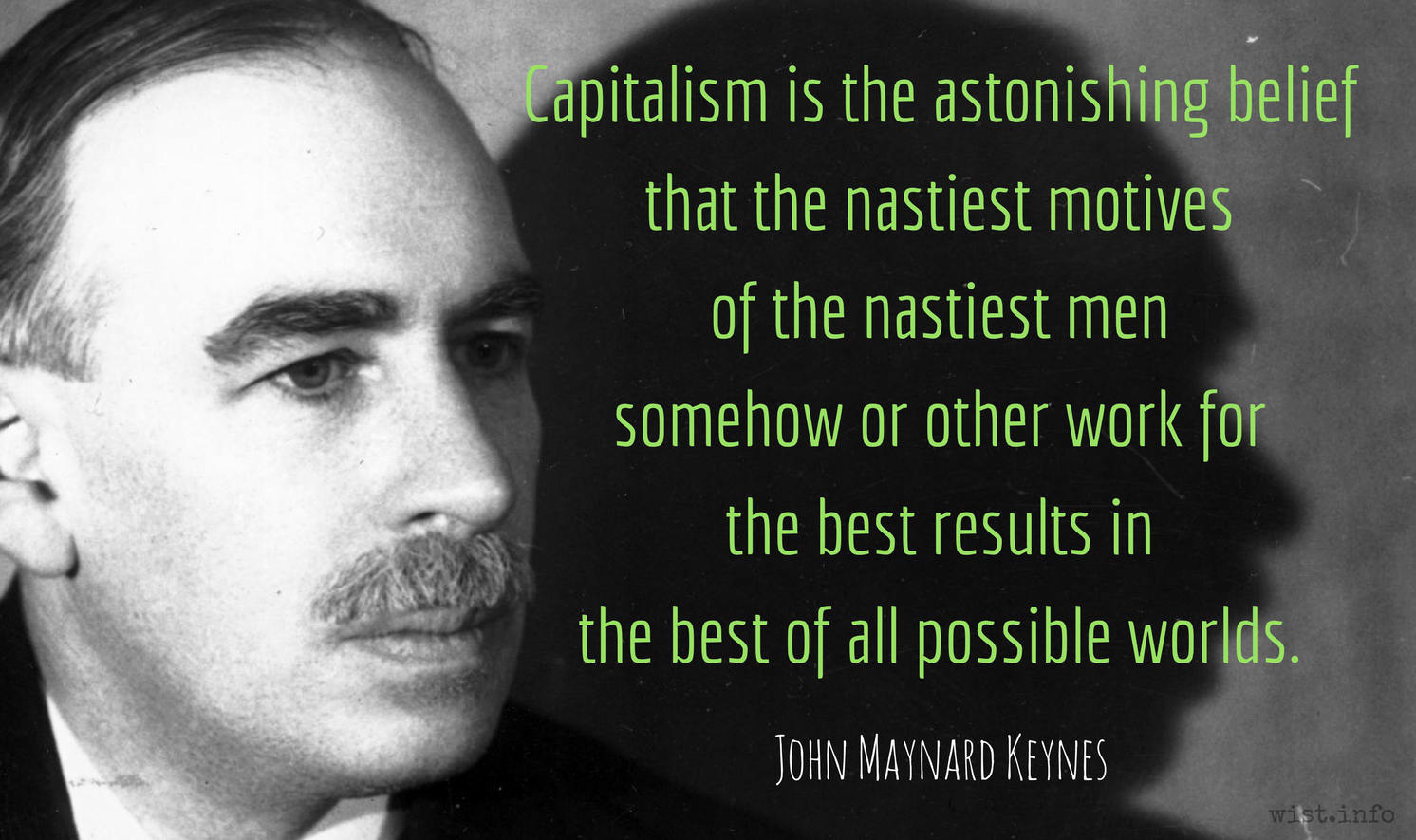“But whom do I treat unjustly,” you say, “by keeping what is my own?” Tell me, what is your own? What did you bring into this life? From where did you receive it? It is as if someone were to take the first seat in the theater, then bar everyone else from attending, so that one person alone enjoys what is offered for the benefit of all in common — this is what the rich do. They seize common goods before others have the opportunity, then claim them as their own by right of preemption. For if we all took only what was necessary to satisfy our own needs, giving the rest to those who lack, no one would be rich, no one would be poor, and no one would be in need.
[Καὶ ποῖον, λέγει, ἀδικῶ, μὲ τὸ νὰ κρατῶ γιὰ τoν ἐαυτόν μου αὐτὰ ποῦ μου ἀνήκουν; Ποία, εἰπέ μου, εἶναι αὐτὰ ποῦ σου ἀνήκουν; Ἀπὸ ποῦ τὰ ἔλαβες, καὶ τὰ ἔφερες στὴν ζωὴν αὐτήν; Ὅπως ἀκριβῶς κάποιος ποὺ εὑρίσκει στὸ θέατρο θέση μὲ καλὴν θέαν, ἐμποδίζει ἔπειτα τοὺς εἰσερχομένους, θεωρώντας ὡς ἰδικὸ τοῦ αὐτὸ ποὺ προορίζεται γιὰ χρῆσιν κοινήν, ἔτσι εἶναι καὶ οἱ πλούσιοι. Ἀφοῦ ἐκυρίευσαν ἐκ τῶν προτέρων τα κοινὰ ἀγαθά, τὰ ἰδιοποιοῦνται ἁπλῶς ἐπειδὴ τὰ ἐπρόλαβαν. Ἐὰν ὁ καθένας ἐκρατοῦσε ἐκεῖνο ποὺ ἀρκεῖ γιὰ τὴν ἱκανοποίηση τῶν ἀναγκῶν του, καὶ ἄφηνε τὸ περίσσευμα σ’ αὐτὸν ποὺ τὸ χρειάζεται, κανεὶς δὲν θὰ ἦταν πλούσιος, ἀλλὰ καὶ κανεὶς πτωχός.]
Basil of Caesarea (AD 330-378) Christian bishop, theologian, monasticist, Doctor of the Church [Saint Basil the Great, Ἅγιος Βασίλειος ὁ Μέγας]
“I Will Tear Down My Barns [καθελῶ μου τὰς ἀποθήκας],” Sermon # 6 [tr. Schroeder (2009)]
(Source)
In C. Paul Schroeder, ed., Saint Basil on Social Justice (2009).
Quotations about:
avarice
Note not all quotations have been tagged, so Search may find additional quotes on this topic.
He does not possess Wealth, it possesses him.
Benjamin Franklin (1706-1790) American statesman, scientist, philosopher, aphorist
Poor Richard (1734 ed.)
(Source)
In truth, it is not want, but rather abundance, that breeds avarice.
[De vray, ce n’est pas la disette, c’est plustost l’abondance qui produict l’avarice.]
Michel de Montaigne (1533-1592) French essayist
Essays, Book 1, ch. 14 “The Taste of Good and Bad Things Depends Mostly on the Opinion We Have of Them [Que le goust des biens et des maux despend en bonne partie de l’opinion que nous en avons]” (1572) (1.14) (1595) [tr. Frame (1943)]
(Source)
Though this chapter was written around 1572 for the 1580 edition, this text was added for the 1588 edition. The chapter as a whole was numbered ch. 14 in the 1580 and 1588 editions, moved to ch. 40 for the 1595 ed. Most modern translations use the original numbering.
(Source (French)). Alternate translations:
Verily, it is not want, but rather plenty that causeth avarice.
[tr. Florio (1603), ch. 40]
In plain truth, it is not Want, but rather Abundance, that Creates Avarice.
[tr. Cotton (1686), ch. 40]
In truth, it is not want, but rather abundance, that creates avarice.
[tr. Cotton/Hazlitt (1877), ch. 40]
In truth, it is not want, but rather abundance, which gives birth to avarice.
[tr. Ives (1925)]
And truly it is not want that produces avarice but plenty.
[tr. Screech (1987)]
Truly, abundance rather than want causes stinginess.
[tr. HyperEssays (2023)]
Let us not envy a certain class of men for their enormous riches; they have paid such an equivalent for them that it would not suit us; they have given for them their peace of mind, their health, their honour, and their conscience; this is rather too dear, and there is nothing to be made out of such a bargain.
[N’envions point à une sorte de gens leurs grandes richesses; ils les ont à titre onéreux, et qui ne nous accommoderait point: ils ont mis leur repos, leur santé, leur honneur et leur conscience pour les avoir; cela est trop cher, et il n’y a rien à gagner à un tel marché.]Jean de La Bruyère (1645-1696) French essayist, moralist
The Characters [Les Caractères], ch. 6 “Of Gifts of Fortune [Des Biens de Fortune],” § 13 (6.13) (1688) [tr. Van Laun (1885)]
(Source)
One translator suggestions the "certain class of men" refers to the partisans, or tax-farmers: private tax collectors, often of humble origin, who purchased the right to their job, and were notorious for turning tax collection into a profitable profession.
(Source (French)). Alternate translations:
Let us not envy some Men their great Riches; their Burthens would be too heavy for us; we cou'd not Sacrifice, as they do, Health, Quiet, Honour and Conscience, to obtain 'em: 'Tis to pay so dear for them that there is nothing to be got by the Bargain.
[Bullord ed. (1696)]
Let us not envy some Men their great Riches, their burden would be too heavy for us; we cou'd not sacrifice, as they do, Health, Quiet, Honour and Conscience, to obtain 'em: 'Tis to pay so dear for 'em, that there is nothing to be got by the Bargain.
[Curll ed. (1713)]
Let us not envy some Men their accountable Riches; their Burthen would be too heavy for us; we could not sacrifice, as they do, Health, Quiet, Honour and Conscience, to obtain them. It is to pay so dear for them, that the Bargain is a Loss.
[Browne ed. (1752)]
We need not envy certain people their great wealth; they acquired it at a heavy cost, which would not suit us; they staked their rest, their health, their honour and their conscience to acquire it; the price is too high, and there is nothing to be gained by such a bargain.
[tr. Stewart (1970)]
When all sinnes grow old, coveteousnesse is young.
George Herbert (1593-1633) Welsh priest, orator, poet.
Jacula Prudentum, or Outlandish Proverbs, Sentences, &c. (compiler), # 18 (1640 ed.)
(Source)
To what extremes, O cursèd lust for gold
will you not drive man’s appetite?
[Per che non reggi tu, o sacra fame
de l’oro, l’appetito de’ mortali?]Dante Alighieri (1265-1321) Italian poet
The Divine Comedy [Divina Commedia], Book 2 “Purgatorio,” Canto 22, l. 40ff (22.40-41) [Statius] (1314) [tr. Musa (1981)]
(Source)
Statius is quoting Virgil (whose shade stands in front of him) from The Aeneid, Book 3, ll. 56-57:
Quid non mortalia pectora cogis,
Auri sacra fames?
Unlike the phrase in that pagan book, which is purely about the corrupting power of greed and gold-lust, Dante's Italian and some translators make reference to a "holy hunger," a virtue/rule of proper attitude toward money and spending, criticized here for it not restraining humans from the sins of being either spendthrifts or misers -- a nod to Aristotle making sin about extremes and virtue about moderation. See Ciardi, Durling, Kirkpatrick, Princeton, and Sayers for more discussion.
(Source (Italian)). Alternate translations:
Why, thou cursed thirst
Of gold! dost not with juster measure guide
The appetite of mortals?
[tr. Cary (1814)]
Why should'st thou not restrain accursèd thirst
Of gold, the appetite of mortals lost?
[tr. Bannerman (1850)]
To what impellest thou not, O cursed hunger
Of gold, the appetite of mortal men?
[tr. Longfellow (1867)]
Why restrainest thou not, O holy hunger of gold, the desire of mortals?
[tr. Butler (1885)]
To what lengths, O thou cursed thirst of gold,
Dost thou not rule the mortal appetite?
[tr. Minchin (1885)]
O cursed hunger of gold, to what dost thou not impel the appetite of mortals?
[tr. Norton (1892)]
Wherefore dost thou not regulate the lust of mortals, O hallowed hunger of gold?
[tr. Okey (1901)]
To what, O cursed hunger for gold, dost thou not drive the appetite of mortals?
[tr. Sinclair (1939)]
O hallowed hunger of gold, why dost thou not
The appetite of mortal men control?
[tr. Binyon (1943)]
With what constraint constran'st thou not the lust
Of mortals, thou devoted greed of gold!
[tr. Sayers (1955)]
To what do you not drive man's appetite,
O cursèd gold-lust!
[tr. Ciardi (1961)]
Why do you not control the appetite
Of mortals, O you accurst hunger for gold?
[tr. Sisson (1981)]
Why cannot you, o holy hunger
for gold, restrain the appetite of mortals?
[tr. Mandelbaum (1982)]
O sacred hunger for gold, why do you not rule human appetite?
[tr. Kline (2002)]
Why do you, O holy hunger for gold, not
govern the appetite of mortals?
[tr. Durling (2003)]
You, awestruck hungering for gold! Why not
impose a rule on mortal appetite?
[tr. Kirkpatrick (2007)]
To what end, O cursèd hunger for gold,
do you not govern the appetite of mortals?
[tr. Hollander/Hollander (2007)]
Accursed craving for money, what is there, in
This world, you don't lead human beings to?
[tr. Raffel (2010)]
Why, if all the rich men in the world divided up their money amongst themselves, there wouldn’t be enough to go round!
Christina Stead (1902-1983) Australian writer
House of All Nations, sc. 12 “The Revolution” [Jules] (1938)
(Source)
Pooh-poohing the idea that confiscating wealth from the rich would provide enough money to the poor. The line is also included in the "Credo" at the beginning of the novel, attributed to the character, Jules Bertillon.
The fable of Tantalus has generally been regarded as symbolizing avarice. It’s at least equally applicable to ambition, love of fame, indeed to almost every passion.
[La fable de Tantale n’a presque jamais servi d’emblème qu’à l’avarice. Mais elle est, pour le moins, autant celui de l’ambition, de l’amour de la gloire, de presque toutes les passions.]Nicolas Chamfort (1741-1794) French writer, epigrammist (b. Nicolas-Sébastien Roch)
Products of Perfected Civilization [Produits de la Civilisation Perfectionée], Part 1 “Maxims and Thoughts [Maximes et Pensées],” ch. 1, ¶ 70 (1795) [tr. Parmée (2003), ¶ 58]
(Source)
(Source (French)). Alternate translations:
The fable of Tantalus is hardly ever applied except to the passion of avarice; but it is at least as applicable to ambition, to the love of glory, and to nearly all the other passions.
[tr. Mathers (1926)]
The fable of Tantalus has been used almost exclusively as an emblem of avarice, but it is at least as applicable to ambition, the love of fame, and virtually all the passions.
[tr. Merwin (1969)]
The fable of Tantalus has almost never served as a precept except in the case of avarice. But it is, at all events, a precept attaching no wit less to ambition, to love of glory, to almost all passions.
[tr. Pearson (1973)]
The fable of Tantalus has nearly only ever served as an emblem of avarice. However, it is at least as much a symbol of ambition, of the love of glory, and of nearly every passion.
[tr. Siniscalchi (1994)]
Whilst that for which all virtue now is sold,
And almost every vice, almighty gold ….Ben Jonson (1572-1637) English playwright and poet
“Epistle to Elizabeth, Countess of Rutland” (1599)
(Source)
Reprinted in The Forest, Poem 12.
The least vile of all merchants is he who says: “Let us be virtuous, since, thus, we shall gain much more money than the fools who are dishonest.” For the merchant, even honesty is a financial speculation.
[Le moins infâme de tous les commerçants, c’est celui qui dit: Soyons vertueux pour gagner beaucoup plus d’argent que les sots qui sont vicieux. — Pour le commerçant, l’honnêteté elle-même est une spéculation de lucre.]
Charles Baudelaire (1821-1867) French poet, essayist, art critic
Journaux Intimes [Intimate Journals], “Mon cœur mis à nu [My Heart Laid Bare],” § 47 (1864–1867; pub. 1887) [tr. Isherwood (1930)]
(Source)
(Source (French)). Alternate translation:
The least despicable of merchants is the one who says: Let us be virtuous so that we can make far more money than those vice-ridden fools. -- For the merchant, even honesty offers a money-making opportunity.
[tr. Sieburth (2022)]
How deep is evil rooted in the breasts
Of all men! tho’ our pardon we extend not
To him, who, grasping at some great reward,
Becomes a sinner: yet since, in proportion
As he grows boldly profligate, he reaps
Greater advantages, he with more ease
The world’s reproachful language may sustain.[ὡς ἔμφυτος μὲν πᾶσιν ἀνθρώποις κάκη”
ὅστις δὲ πλεῖστον μισϑὸν εἰς χεῖρας λαβὼν
κακὸς γένηται, τῷδε συγγνώμη μὲν οὔ,
πλείω δὲ μισϑὸν μείζονος τόλμης ἔχων
τὸν τῶν λεγόντων ῥᾷον ἂν φέροι Ῥόγον.]Euripides (485?-406? BC) Greek tragic dramatist
Bellerophon [Βελλεροφῶν], frag. 297 (TGF) (c. 430 BC) [tr. Wodhull (1809)]
(Source)
Nauck frag. 299. Barnes frag. 44, Musgrave frag. 9. (Source (Greek)). Alternate translations:
All men have badness in their natures! The one who takes most pay into his hands, and proves bad, gets no pardon; but if he has more pay for greater audacity, he'll endure censorious talk more easily.
[tr. Collard, Hargreaves, Cropp (1995)]
There is evil in all men. Whoever gets his hands on good money and is seen to be wicked, he is roundly condemned. But if he were yet more daring, gaining even greater reward, he would have less of a problem enduring being criticized by others.
[tr. Stevens (2012)]
But the rich man is tortured by fears, wasted with griefs, aflame with greed, never free from care, always restless and uneasy, out of breath from unending struggles with his enemies. It is true enough that he increases his holdings beyond measure by going through these miseries; but at the same time, thanks to that very increase, he also multiples his bitter cares. In contrast, the individual of moderate means is satisfied with his small and limited property; he is loved by family and friends; he enjoys sweet peace with his relations, neighbors, and friends; he is devout in his piety, benevolent of mind, sound of body, moderate in his style of life, unblemished in character, and untroubled in conscience. I do not know whether anyone would be so foolish as to have any doubt about which of the two to prefer.
[Alium praediuitem cogitemus; sed diuitem timoribus anxium, maeroribus tabescentem, cupiditate flagrantem, numquam securum, semper inquietum, perpetuis inimicitiarum contentionibus anhelantem, augentem sane his miseriis patrimonium suum in inmensum modum atque illis augmentis curas quoque amarissimas aggerantem; mediocrem uero illum re familiari parua atque succincta sibi sufficientem, carissimum suis, cum cognatis uicinis amicis dulcissima pace gaudentem, pietate religiosum, benignum mente, sanum corpore, uita parcum, moribus castum, conscientia securum. Nescio utrum quisquam ita desipiat, ut audeat dubitare quem praeferat.]
Augustine of Hippo (354-430) Christian church father, philosopher, saint [b. Aurelius Augustinus]
City of God [De Civitate Dei], Book 4, ch. 3 (4.3) (AD 412-416) [tr. Babcock (2012)]
(Source)
On wealth and power as the foundation for happiness.
(Source (Latin)). Alternate translations:
Let my wealthy man take with him fears, sorrows, covetousness, suspicion, disquiet, contentions, making immense additions to his estate only by adding to his heap of most bitter cares; and let my poor man take with him sufficiency with little, love of kindred, neighbours, friends, joyous peace, peaceful religion, soundness of body, sincereness of heart, abstinence of diet, chastity of carriage, and security of conscience. Where should a man find any one so sottish as would make a doubt which of these to prefer in his choice?
[tr. Healey (1610)]
But the rich man is anxious with fears, pining with discontent, burning with covetousness, never secure, always uneasy, panting from the perpetual strife of his enemies, adding to his patrimony indeed by these miseries to an immense degree, and by these additions also heaping up most bitter cares. But that other man of moderate wealth is contented with a small and compact estate, most dear to his own family, enjoying the sweetest peace with his kindred neighbors and friends, in piety religious, benignant in mind, healthy in body, in life frugal, in manners chaste, in conscience secure. I know not whether any one can be such a fool, that he dare hesitate which to prefer.
[ed. Dods (1871)]
But, our wealthy man is haunted by fear, heavy with cares, feverish with greed, never secure, always restless, breathless from endless quarrels with his enemies. By these miseries, he adds to his possessions beyond measure, but he also piles up for himself a mountain of distressing worries. The man of modest means is content with a small and compact patrimony. He is loved by his own, enjoys the sweetness of peace, in his relations with kindred, neighbors, and friends, is religious and pious, of kindly disposition, healthy in body, self-restrained, chaste in morals, and at peace with his conscience. I wonder if there is anyone so senseless as to hesitate over which of the two to prefer.
[tr. Zema/Walsh (1950)]
Let us suppose that the rich man is troubled by fears, pining with grief, burning with desire, never secure, always restless, panting in ceaseless struggles with his foes, though he does, to be sure, by dint of such suffering accumulate great additions to his estate even beyond measure, these additions adding also their quota of corrosive anxieties. Let the man of modest means, on the other hand, be self-sufficient on his trim and tiny property, beloved by his family, enjoying the most agreeable relations with his kindred, neighbours and friends, devoutly religious, kindly disposed, in good physical condition, leading a simple life, free from vice and untroubled in conscience. I don’t suppose that there is anyone so foolish as to think of doubting which one he would prefer.
[tr. Green (Loeb) (1963)]
But the rich man is tortured by fears, worn out with sadness, burnt up with ambition, never knowing serenity of repose, always panting and sweating in his struggles with opponents. It may be true that he enormously swells his patrimony, but at the cost of those discontents, while by this increase he heaps up a load of further anxiety and bitterness. The other man, the ordinary citizen, is content with his strictly limited resources. He is loved by family and friends; he enjoys the blessing of peace with his relations, neighbours, and friends; he is loyal, compassionate, and kind, healthy in body, temperate in habits, of unblemished character, and enjoys the serenity of a good conscience. I do not think anyone would be fool enough to hesitate about which he would prefer.
[tr. Bettenson (1972)]
The wealthy man, however, is troubled by fears; he pines with grief; he burns with greed. He is never secure; he is always unquiet and panting from endless confrontations with his enemies. To be sure, he adds to his patrimony in immense measure by these miseries; but alongside these additions he also heaps up the most bitter cares. By contrast, the man of moderate means is self-sufficient on his small and circumscribed estate. He is of his own family, and rejoices in the most sweet peace with kindred, neighbours and friends. He is devoutly religious, well disposed in mind, healthy in body, frugal in life, chaste in morals, untroubled in conscience. I do not know if anyone could be such a fool as to dare to doubt which to prefer.
[tr. Dyson (1998)]
You have reached the pinnacle of success as soon as you become uninterested in money, compliments, or publicity.
Orlando A. Battista (1917-1995) Canadian-American chemist, aphorist
Quotoons: A Speaker’s Dictionary, No. 3962 (1977 ed.)
(Source)
Often misattributed to Thomas Wolfe. More discussion about the origin of quotation: You Have Reached the Pinnacle of Success as Soon as You Become Uninterested in Money, Compliments, or Publicity – Quote Investigator®.
Money was made, not to command our Will,
But all our lawful pleasures to fulfil.
Shame and Woe to us, if we our Wealth obey;
The Horse doth with the Horseman run away.Abraham Cowley (1618-1667) English poet and essayist
“Paraphrase upon the 10th Epistle of the First Book of Horace,” l. 75ff.
(Source)
Where large sums of money are concerned, it is advisable to trust nobody.
And who can suffer injury by just taxation, impartial laws and the application of the Jeffersonian doctrine of equal rights to all and special privileges to none? Only those whose accumulations are stained with dishonesty and whose immoral methods have given them a distorted view of business, society and government. Accumulating by conscious frauds more money than they can use upon themselves, wisely distribute or safely leave to their children, these denounce as public enemies all who question their methods or throw a light upon their crimes.
William Jennings Bryan (1860–1925) American lawyer, statesman, politician, orator
Speech, Madison Square Garden, New York (1906-08-30)
(Source)
Plato said that virtue has no master. If a person does not honor this principle and rejoice in it, but is purchasable for money, he creates many masters for himself.
Apollonius of Tyana (c. AD 15-100) Greek philosopher and religious leader [Ἀπολλώνιος]
Letters from Apollonius of Tyana, ep. 15, Letter to Euphrates [tr. Jones (2006)]
(Source)
The reference to Plato's Republic, X 617 E.
If you make money your god, it will plague you like the devil.
(Other Authors and Sources)
English proverb
Sometimes "'twill plague you".
An anonymous proverb, recorded in Thomas Fielding, ed., Select Proverbs of All Nations (1824). Thomas Fielding was the pseudonym of John Wade (1788-1875), a British journalist and author.
Though Fielding was only a compiler of proverbs and aphorisms, the quotation then shows up in a variety of collections later in the 19th Century actually cited to "Fielding," e.g., H. Southgate, ed., Many Thoughts of Many Minds (1862); John Camden Hotten, ed. The Golden Treasury of Thought (1873); Edward Parsons Day, ed., Day's Collacon: an Encyclopaedia of Prose Quotations (1884).
In relatively short order, this "Fielding" then became conflated with the more famous English writer Henry Fielding (1707-1754), to whom this quotation is often credited.
Gold and silver are the gods you adore
In what are you different from the idolater,
save that he worships one, and you a score?[Fatto v’avete dio d’oro e d’argento;
e che altro è da voi a l’idolatre,
se non ch’elli uno, e voi ne orate cento?]Dante Alighieri (1265-1321) Italian poet
The Divine Comedy [Divina Commedia], Book 1 “Inferno,” Canto 19, l. 112ff (19.112-114) [Dante] (1309) [tr. Ciardi (1954)]
(Source)
Chiding the damned shade of Pope Nicholas III (reigned 1280-1303), who was infamous for his corruption, extorting lands for the Church from nobles before giving his blessing, taking bribes, and selling holy offices (simonism); the last has landed him in the Eighth Circle, third Bolgia, with the other simoniacs.
(Source (Italian)). Alternate translations:
But you of silver and gold have made
Your God: What differs your Idolatry
From that of others, but that they did one
Alone, and you a hundred Gods adore.
[tr. Rogers (1782), l. 109ff]
Go, seek your Saviour in the delved mine.
And bid the Idolater the palm resign;
Thine is a Legion, his a single God!
[tr. Boyd (1802), st. 19]
Of gold and silver ye have made your god,
Diff’ring wherein from the idolater,
But he that worships one, a hundred ye?
[tr. Cary (1814)]
Silver and gold ye make your god: what more
Divides the brute idolater and you,
Save that he one, a hundred ye adore?
[tr. Dayman (1843)]
Ye have made you a god of gold and silver; and wherein do ye differ from the idolater, save that he worships one, and ye a hundred?
[tr. Carlyle (1849)]
Of gold and silver you have made your god,
Idols of yours and others to recount,
Theirs to one, to a hundred yours amount.
[tr. Bannerman (1850)]
Or gold and silver ye your gods have made;
And what is 'twist th' idolater and you,
But he to one -- ye to a hundred pray.
[tr. Johnston (1867)]
Ye have made yourselves a god of gold and silver;
And from the idolater how differ ye,
Save that he one, and ye a hundred worship?
[tr. Longfellow (1867)]
Ye have made a god of gold and silver, and what else is there between you and the idolater save that he worships one, and you a hundred.
[tr. Butler (1885)]
Ye've made your God of silver and of gold.
Ye from idolaters what line withdraws.
Save they sin once, and ye a hundredfold?
[tr. Minchin (1885)]
Ye have made you a god of gold and silver: and what difference is there between you and the idolater save that he worships one and ye a hundred?
[tr. Norton (1892)]
A god ye have made yourselves of gold and silver,
And from idolaters what else divides you,
Save that they pray to one and you a hundred?
[tr. Griffith (1908)]
You have made you a god of gold and silver, and what is there between you and teh idolaters but that they worship one and you a hundred?
[tr. Sinclair (1939)]
A God of silver and gold ye have made to adore;
And how do ye differ from the idolater
Sav e that he worships one, and ye five-score?
[tr. Binyon (1943)]
You deify silver and gold; how are you sundered
In any fashion from the idolater,
Save that he serves one god and you an hundred?
[tr. Sayers (1949)]
You have made you a god of gold and silver; and wherein do you differ from the idolaters, save that they worship one, and you a hundred?
[tr. Singleton (1970)]
You have built yourselves a God of gold and silver!
How do you differ from the idolater,
except he worships one, you worship hundreds?
[tr. Musa (1971)]
You’ve made yourselves a god of gold and silver;
how are you different from idolaters,
save that they worship one and you a hundred?
[tr. Mandelbaum (1980)]
You have made a god of gold and silver:
And how do you differ from an idolater,
Except that he prays to one, and you to a hundred?
[tr. Sisson (1981)]
You made a god of gold and silver: wherein
Is it you differ from the idolatrous --
Save that you worship a hundred, they but one?
[tr. Pinsky (1994), l. 105ff]
You have made gold and silver your god; and what difference is there between you and the idol-worshipper, except that he prays to one, and you to a hundred?
[tr. Durling (1996)]
You have made a god for yourselves of gold and silver, and how do you differ from the idolaters, except that he worships one image and you a hundred?
[tr. Kline (2002)]
Silver and gold you have made your god. And what’s
the odds -- you and some idol-worshipper?
He prays to one, you to a gilded hundred.
[tr. Kirkpatrick (2006)]
You have wrought yourselves a god of gold and silver.
How then do you differ from those who worship idols
except they worship one and you a hundred?
[tr. Hollander/Hollander (2007)]
The god you made for yourself is silver and gold --
And where are you different, you and worshippers
Of idols? They have one, and you a hundred.
[tr. Raffel (2010)]
You thieves reigned,
Making a God of gold and silver. Room
Does not exist between the idolaters
And you, except they worship one, and you
A hundred.
[tr. James (2013)]
For what is there more hideous than avarice, more brutal than lust, more contemptible than cowardice, more base than stupidity and folly? Well, then, are we to call those persons unhappy, who are conspicuous for one or more of these, on account of some injuries, or disgraces, or sufferings to which they are exposed, or on account of the moral baseness of their sins?
[Quid enim foedius auaritia, quid immanius libidine, quid contemptius timiditate, quid abiectius tarditate et stultitia dici potest? Quid ergo? Eos qui singulis uitiis excellunt aut etiam pluribus, propter damna aut detrimenta aut cruciatus aliquos miseros esse dicimus, an propter uim turpitudinemque uitiorum?]
Marcus Tullius Cicero (106-43 BC) Roman orator, statesman, philosopher
De Legibus [On the Laws], Book 1, ch. 19 / sec. 51 (1.19/1.51) [Marcus] (c. 51 BC) [tr. Barham/Yonge (1878)]
(Source)
(Source (Latin)). Alternate translations:
For what is there more hideous than avarice, more ferocious than lust, more contemptible than cowardice, more base than stupidity and folly? Well, therefore, may we style unhappy, those persons in whom any one of these vices is conspicuous, not on account of the disgraces or losses to which they are exposed, but on account of the moral baseness of their sins.
[tr. Barham (1842)]
For what can be thought of that is more loathsome than greed, what more inhuman than lust, what more contemptible than cowardice, what more degraded than stupidity and folly? Well, then, shall we say that those who are sunk deepest in a single vice, or in several, are wretched on account of any penalties or losses or tortures which they incur, or on account of the base nature of the vices themselves?
[tr. Keyes (1928)]
What can be called more revolting than greed, more bestial than lust, more despicable than cowardice, more abject than dullness and stupidity? What then? Take those people who are conspicuous for one (or more than one) vice. Do we call them wretched because of the losses or damages or pain they suffer, or because of the power and ugliness of their vices?
[tr. Rudd (1998)]
What is uglier than greed, what is more horrible than lust, what is more contemptible than cowardice, what is lower than sloth and stupidity? What then? People who are remarkable for single vices or even for several -- do we call them wretched because of material losses or torture, or because of the great dishonor from the vices themselves?
[tr. Zetzel (1999)]
What could be called fouler than avarice, what more monstrous than lust, what more scorned than cowardice, what more despicable than dullness and foolishness? What then? Do we say about those who are conspicuous for their individual vices, or even many vices, that they are wretched because of losses or damages or tortures, or because of the significance and the disgrace of their vices?
[tr. Fott (2013)]
You now can see, dear son, the short-lived pranks
that goods consigned to Fortune’s hand will play,
causing such squabbles in the human ranks.
For all the gold that lies beneath the moon —
or all that ever did lie there — would bring
no respite to these worn-out souls, not one.[Or puoi, figliuol, veder la corta buffa
d’i ben che son commessi a la fortuna,
per che l’umana gente si rabuffa;
ché tutto l’oro ch’è sotto la luna
e che già fu, di quest’anime stanche
non poterebbe farne posare una.]Dante Alighieri (1265-1321) Italian poet
The Divine Comedy [Divina Commedia], Book 1 “Inferno,” Canto 7, l. 61ff (7.61-66) [Virgil] (1309) [tr. Kirkpatrick (2006)]
(Source)
On the never-ending labor and contention between the hoarders and the wasters. (Source (Italian)). Alternate translations:
Therefore, my Son, the vanity you may
Of Fortune's gifts perceive, for which Mankind
Raise such a bustle, and so much contend.
Not all the Gold which is beneath the moon,
Or which was by these wretched Souls possess'd,
Could ever satisfy their craving minds.
[tr. Rogers (1782), l. 53ff]
Learn hence of mortal things how vain the boast,
Learn to despise the low, degen'rate host,
And see their wealth how poor, how mean their pride;
Not all the mines below the wand'ring moon,
Not all the sun beholds at highest noon,
Can for a moment bid the fray subside.
[tr. Boyd (1802), st. 11]
Now may’st thou see, my son! how brief, how vain,
The goods committed into fortune’s hands,
For which the human race keep such a coil!
Not all the gold, that is beneath the moon,
Or ever hath been, of these toil-worn souls
Might purchase rest for one.
[tr. Cary (1814)]
Now may'st thou, son, behold how brief the shuffle
Of goods by shifting Fortune held in store,
For which the human kind so fiercely ruffle:
Since all below the moon of golden ore
That lies, or all those weary souls possessed,
Could purchase none a moment's peace the more.
[tr. Dayman (1843)]
But thou, my Son, mayest [now] see the brief mockery of the goods that are committed unto Fortune, for which the human kind contend with each other.
For all the gold that is beneath the moon, or ever was, could not give rest to a single one of these weary souls.
[tr. Carlyle (1849)]
Now see, my son, how frivolous and vain
The goods committed unto Fortune's hand,
For which the race will so rebutting stand.
Not all the gold that is beneath the moon,
Nor all these toil-worn creatures have possessed,
could purchase for them but a moment's rest.
[tr. Bannerman (1850)]
And now, my son, behold the folly brief
of the world's goods to fortune's guidance given,
And for which men so struggle and dispute.
Not all the gold that is beneath the moon,
Or ever was, unto these wearied souls
Could give one hour of respite or of peace.
[tr. Johnston (1867)]
Now canst thou. Son, behold the transient farce
Of goods that are committed unto Fortune,
For which the human race each other buffet;
For all the gold that is beneath the moon,
Or ever has been, of these weary souls
Could never make a single one repose.
[tr. Longfellow (1867)]
Now canst thou, my son, see the short game of the goods which are entrusted to Fortune, for which the human race buffet each other. For all the gold that is beneath the moon and that ever was, of these wearied souls could never make one of them rest.
[tr. Butler (1885)]
Now thou canst see, O son, the short-lived day
Of good, committed unto Fortune's 'hest,
For which the human race so strives alway.
Since all the gold beneath the moon possest,
Or ever owned by those worn souls of yore,
Could not make one of them one moment rest.
[tr. Minchin (1885)]
Now canst thou, son, see the brief jest of the goods that are committed unto Fortune, for which the human race so scramble; for all the gold that is beneath the moon, or that ever was, of these weary souls could not make a single one repose.
[tr. Norton (1892)]
Here mayest thou see, my son, the fleeting mockery of wealth that is the sport of Fortune, for sake of which men strive with one another. For all the gold that is, or ever hath been beneath the moon, could not procure repose for one of these weary souls.
[tr. Sullivan (1893)]
Now canst thou see, my son, how vain and short-lived
Are the good things committed unto fortune,
For which sake human folk set on each other.
For all the gold on which the moon now rises,
Or ever rose, would be quite unavailing
To set one of these weary souls at quiet.
[tr. Griffith (1908)]
Now mayst thou see, my son, the brief mockery of wealth committed to fortune, for which the race of men embroil themselves; for all the gold that is beneath the moon, or ever was, could not give rest to one of these weary souls.
[tr. Sinclair (1939)]
Now, my son, see to what a mock are brought
The goods of Fortune's keeping, and how soon!
Though to possess them still is all man's thought.
For all the gold that is beneath the moon,
Or ever was, never could buy repose
For one of those souls, faint to have that boon.
[tr. Binyon (1943)]
See now, my son, the fine and fleeting mock
Of all those goods men wrangle for -- the boon
That is delivered into the hand of Luck;
For all the gold that is beneath the moon,
Or ever was, could not avail to buy
Repose for one of these weary souls -- not one.
[tr. Sayers (1949)]
Now may you see the fleeting vanity
of the goods of Fortune for which men tear down
all that they are, to build a mockery.
Not all the gold that is or ever was
under the sky could buy for one of these
exhausted souls the fraction of a pause.
[tr. Ciardi (1954)]
Now you can see, my son, the brief mockery of the goods that are committed to Fortune, for which humankind contend with one another; because all the gold that is beneath the moon, or ever was, would not give rest to a single one of these weary souls.
[tr. Singleton (1970)]
You see, my son, the short-lived mockery
of all the wealth that is in Fortune's keep,
over which the human race is bickering;
for all the gold that is or ever was
beneath the moon won't buy a moment's rest
for even one among these weary souls.
[tr. Musa (1971)]
Now you can see, my son, how brief's the sport
of all those goods that are in Fortune's care,
for which the tribe of men contend and brawl;
for all the gold that is or ever was
beneath the moon could never offer rest
to even one of these exhausted spirits.
[tr. Mandelbaum (1980)]
Now you can see, my son, how short a life
Have the gifts which are distributed by Fortune,
And for which people get rough with one another:
So that all the gold there is beneath the moon
And all there ever was, could never give
A moment's rest to one of these tired souls.
[tr. Sisson (1981)]
Now you can see, my son, how ludicrous
And brief are all the goods in Fortune's ken,
Which humankind contend for: you see from this
How all the gold there is beneath the moon,
Or that there ever was, could not relieve
One of these weary souls.
[tr. Pinsky (1994), l. 55ff]
Now you can see, my son, the brief mockery of the goods that are committed to Fortune, for which the human race so squabbles;
for all the gold that is under the moon and that ever was, could not give rest to even one of these weary souls.
[tr. Durling (1996)]
But you, my son, can see now the vain mockery of the wealth controlled by Fortune, for which the human race fight with each other, since all the gold under the moon, that ever was, could not give peace to one of these weary souls.
[tr. Kline (2002)]
Now you see, my son, what brief mockery
Fortune makes of goods we trust her with,
for which the race of men embroil themselves.
All the gold that lies beneath the moon,
or ever did, could never give a moment's rest
to any of these wearied souls.
[tr. Hollander/Hollander (2007)]
Now see, my son, the futile mockery
Of spending a life accumulating possessions,
Competing with fortune and men for worthless frippery:
Take all the gold still lying under the moon,
Add all that ever was and you could not buy
A moment of rest for one of these souls -- not one.
[tr. Raffel (2010)]
You see it clear,
My son: the squalid fraud as brief as life
Of goods consigned to Fortune, whereupon
Cool heads come to the boil, hands to the knife.
For all the gold there is, and all that's gone,
Would give no shred of peace to even one
Of these drained souls.
[tr. James (2013), l. 56ff]
‘Tis unbecoming not to shed a tear
Over the wretched; he too is devoid
Of virtue, who abounds in wealth, yet scruples
Thro’ sordid avarice to relieve their wants.Euripides (485?-406? BC) Greek tragic dramatist
Antiope [Αντιοπη], frag. (c. 410 BC) [tr. Wodhall (1809)]
(Source)
Barnes frag. 62, Musgrave frag. 40.
It’s like this: if you have one piece of cake, and you eat it, that’s fine. If you have two pieces of cake, you should probably share some with a friend. But maybe not. Occasionally we could all use two pieces of cake. But if you have a whole cake, and you eat all of it, that’s not very cool. It’s not just selfish, it’s kinda sick and unhealthy.
Patrick Rothfuss (b. 1973) American author
“Concerning Cake, Bilbo Baggins and Charity,” Blog Entry (19 Jan 2014)
(Source)
A conservative is a man who has plenty of money and doesn’t see any reason why he shouldn’t always have plenty of money.
Will Rogers (1879-1935) American humorist
“We’re Off to a Flying Start,” Column #535 (26 Mar 1933)
(Source)
Collected in Steven Grager, ed., Will Rogers' Weekly Articles, Vol. 6 "The Roosevelt Years, 1933-1935" (2011 ed.). Also reprinted in abbreviated format, in Donald Day, ed., The Autobiography of Will Rogers (1949).
Fell lust of gold! abhorred, accurst!
What will not men to slake such thirst?[Quid non mortalia pectora cogis,
Auri sacra fames?]Virgil (70-19 BC) Roman poet [b. Publius Vergilius Maro; also Vergil]
The Aeneid [Ænē̆is], Book 3, l. 56ff (3.56-57) [Aeneas] (29-19 BC) [tr. Conington (1866)]
(Source)
Regarding the murder of Polydorus.
(Source (Latin)). Alternate translations:
Dire thirst of gold, what dost not thou constrain
In mortall breasts!
[tr. Ogilby (1649)]
O sacred hunger of pernicious gold!
What bands of faith can impious lucre hold?
[tr. Dryden (1697)]
Cursed thirst of gold, to what dost thou not drive the hearts of men?
[tr. Davidson/Buckley (1854)]
Cursèd thirst for gold,
What crimes dost thou not prompt in mortal breasts!
[tr. Cranch (1872), ll. 70-71]
Accursed thirst for gold! what dost thou not compel mortals to do?
[Source (1882)]
O accursed hunger of gold, to what dost thou not compel human hearts!
[tr. Mackail (1885)]
O thou gold-hunger cursed, and whither driv'st thou not
The hearts of men?
[tr. Morris (1900)]
Curst greed of gold, what crimes thy tyrant power attest!
[tr. Taylor (1907), st. 8, l. 72]
O, whither at thy will,
curst greed of gold, may mortal hearts be driven?
[tr. Williams (1910)]
To what crime do you not drive the hearts of men, O accursed hunger for gold?
[tr. Fairclough (1916)]
There is nothing
To which men are not driven by that hunger.
[tr. Humphries (1951)]
What lengths is the heart of man driven to
By this cursed craving for gold!
[tr. Day Lewis (1952)]
To what, accursed lust for gold, do you
not drive the hearts of men?
[tr. Mandelbaum (1971), ll. 73-74]
To what extremes
Will you not drive the hearts of men, accurst
Hunger for gold!
[tr. Fitzgerald (1981), ll. 79-81]
Greed for gold is a curse. There is nothing to which it does not drive the minds of men.
[tr. West (1990)]
Accursed hunger for gold, to what do you
not drive human hearts!
[tr. Kline (2002)]
To what extremes won't you compel our hearts,
you accursed lust for gold?
[tr. Fagles (2006)]
Unholy lust for gold! Is there nothing men won't do for you?
[tr. Bartsch (2021)]
It is in vain to Say that Democracy is less vain, less proud, less selfish, less ambitious or less avaricious than Aristocracy or Monarchy. It is not true in Fact and no where appears in history. Those Passions are the same in all Men under all forms of Simple Government, and when unchecked, produce the same Effects of Fraud Violence and Cruelty. When clear Prospects are opened before Vanity, Pride, Avarice or Ambition, for their easy gratification, it is hard for the most considerate Phylosophers and the most conscientious Moralists to resist the temptation. Individuals have conquered themselves, Nations and large Bodies of Men, never.
John Adams (1735-1826) American lawyer, Founding Father, statesman, US President (1797-1801)
Letter to John Taylor (17 Dec 1814)
(Source)
For the old notions of civil liberty and social order did not benefit the masses of the people. Wealth increased, without relieving their wants. The progress of knowledge left them in abject ignorance. Religion flourished, but failed to reach them. Society, whose laws were made by the upper class alone, announced that the best thing for the poor is not to be born, and the next best, to die in childhood, and suffered them to live in misery and crime and pain. As surely as the long reign of the rich has been employed in promoting the accumulation of wealth, the advent of the poor to power will be followed by schemes for diffusing it. Seeing how little was done by the wisdom of former times for education and public health, for insurance, association, and savings, for the protection of labour against the law of self-interest, and how much has been accomplished in this generation, there is reason in the fixed belief that a great change was needed, and that democracy has not striven in vain.
John Dalberg, Lord Acton (1834-1902) British historian
“Review of Sir Erskine May’s Democracy in Europe,” The Quarterly Review (Jan 1878)
(Source)
Preacher preaching love like vengeance
Preaching love like hate
Calling for large donations
Promising estates
Rolling lawns and angel bands
Behind the pearly gates
You know he will have his in this life
But yours will have to wait
He’s immaculately tax freeJoni Mitchell (b. 1943) Canadian singer-songwriter and painter [b. Roberta Joan Anderson]
“Tax Free” Joni Mitchell (1985)
(Source)
We are all born brave, trusting and greedy, and most of us manage to remain greedy.
Mignon McLaughlin (1913-1983) American journalist and author
The Second Neurotic’s Notebook, ch. 9 (1966)
(Source)
There is always someone ready to be lured to ruin by hope of gain.
[ἀλλ᾽ ὑπ᾽ ἐλπίδων ἄνδρας τὸ κέρδος πολλάκις διώλεσεν.]
Sophocles (496-406 BC) Greek tragic playwright
Antigone, l. 221ff [Creon] (441 BC) [tr. Watling (1947)]
(Source)
Original Greek. Alternate translations:
- "But backed by hope, lucre has ruined many." [tr. Donaldson (1848)]
- "Yet hope of gain hath lured men to their ruin oftentimes." [tr. Storr (1859)]
- "But hope of gain full oft ere now hath been the ruin of men." [tr. Campbell (1873)]
- "Yet by just the hope of it, money has many times corrupted men." [tr. Jebb (1891)]
- "Yet lucre hath oft ruined men through their hopes." [tr. Jebb (1917)]
- "Yet money talks, and the wisest have sometimes been known to count a few coins too many." [tr. Fitts/Fitzgerald (1939)]
- "But often we have known men to be ruined by the hope of profit." [tr. Wyckoff (1954)]
- "But love of gain has often lured a man to his destruction." [tr. Kitto (1962)]
- "But all too often the mere hope of money has ruined many men." [tr. Fagles (1982)]
- "But hope -- and bribery -- often have led men to destruction." [tr. Woodruff (2001)]
- "But profit with its hopes often destroys men." [tr. Tyrell/Bennett (2002)] https://diotima-doctafemina.org/translations/greek/sophocles-antigone/#post-1273:~:text=But%20profit,with%20its%20hopes%20often%20destroys%20men.
- "Yet there are men who the mere hope of winning has killed them." [tr. Theodoridis (2004)]
- "And yet men have often been destroyed because they hoped to profit in some way." [tr. Johnston (2005)]
- "But often profit has destroyed men through their hopes." [tr. Thomas (2005)]
- "But the profit-motive has destroyed many people in their hope for gain." [tr. @sentantiq (2018)]
A society which reverences the attainment of riches as the supreme felicity will naturally be disposed to regard the poor as damned in the next world, if only to justify making their life a hell in this.
R. H. Tawney (1880-1962) English writer, economist, historian, social critic [Richard Henry Tawney]
Religion and the Rise of Capitalism, ch. 4: The Puritan Movement, sec. 4 “The New Medicine for Poverty” (1926)
(Source)
Originally delivered as Holland Lectures, Kings College (Feb-Mar 1922).
If all men were rich, all men would be poor.
Mark Twain (1835-1910) American writer [pseud. of Samuel Clemens]
Mark Twain’s Noteook (1935 ed) [ed. Paine]
(Source)
CREON: Prophecies? All your tribe wants is to make money.
TIRESIAS: And what about tyrants? Filthy lucre is all you want![Κρέων: τὸ μαντικὸν γὰρ πᾶν φιλάργυρον γένος.
Τειρεσίας: τὸ δ᾽ ἐκ τυράννων αἰσχροκέρδειαν φιλεῖ.]Sophocles (496-406 BC) Greek tragic playwright
Antigone, l. 1055ff (441 BC) [tr. Woodruff (2001)]
(Source)
Argument between Creon, the king, and Teiresias, his seer. Original Greek. Alternate translations:
KREON: The race of seers is wholly given to pelf.
TEIRESIAS: The tyrant-race is given to filthy lucre.
[tr. Donaldson (1848)]
CREON: Prophets are all a money-getting tribe.
TEIRESIAS: And kings are all a lucre-loving race.
[tr. Campbell (1873)]
CREON: Desire of money is the prophet's plague.
TIRESIAS: And ill-sought lucre is the curse of kings.
[tr. Storr (1859)]
CREON: Yes, for the prophet-clan was ever fond of money.
TEIRESIAS: And the race sprung from tyrants loves shameful gain.
[tr. Jebb (1891)]
CREON: Your prophetic race are lovers all of gold.
TIRESIAS: Tyrants are so, howe'er illgotten.
[tr. Werner (1892)]
CREON: Well, the prophet-tribe was ever fond of money.
TEIRESIAS: And the race bred of tyrants loves base gain.
[tr. Jebb (1917)]
CREON: The generation of prophets has always loved gold.
TEIRESIAS: The generation of kings has always loved brass.
[tr. Fitts/Fitzgerald (1939)]
CREON: I say all prophets seek their own advantage.
TEIRESIAS: All kings, I say, seek gain unrighteously.
[tr. Watling (1947)]
CREON: Well, the whole crew of seers are money-mad.
TEIRESIAS: And the whole tribe of tyrants grab at gain.
[tr. Wyckoff (1954)]
CREON: Prophets have always been too fond of gold.
TEIRESIAS: And tyrants, of the shameful use of power.
[tr. Kitto (1962)]
CREON: You and the whole breed of seers are mad for money!
TIRESIAS: And the whole race of tyrants lusts for filthy gain.
[tr. Fagles (1982), l. 1171ff]
CREON: Yes, for the whole family of prophets is philos to silver.
TIRESIAS: And the family of absolute rulers holds disgraceful profits as philoi.
[tr. Tyrell/Bennett (2002)]
CREON: The whole race of prophets loves money.
TEIRESIAS: And the kings love their shameful profits.
[tr. Theodoridis (2004)]
CREON: The tribe of prophets --
all of them -- are fond of money.
TEIRESIAS: And kings?
Their tribe loves to benefit dishonestly.
[tr. Johnston (2005), l. 1180ff]
TEIRESIAS: The race of tyrants loves shameful profit.
[tr. @senstantiq (2018)]
As soon as riches came to be held in honour, when glory, dominion, and power followed in their train, virtue began to lose its lustre, poverty to be considered a disgrace, blamelessness to be termed malevolence. Therefore as the result of riches, luxury and greed, united with insolence, took possession of our young manhood. They pillaged, squandered; set little value on their own, coveted the goods of others; they disregarded modesty, chastity, everything human and divine; in short, they were utterly thoughtless and reckless.
[Postquam divitiae honori esse coepere et eas gloria, imperium, potentia sequebatur, hebescere virtus, paupertas probro haberi, innocentia pro malivolentia duci coepit. Igitur ex divitiis iuventutem luxuria atque avaritia cum superbia invasere; rapere, consumere, sua parvi pendere, aliena cupere, pudorem, pudicitiam, divina atque humana promiscua, nihil pensi neque moderati habere.]
Sallust (c. 86-35 BC) Roman historian and politician [Gaius Sallustius Crispus]
Bellum Catilinae [The War of Cateline; The Conspiracy of Catiline], ch. 12, sent. 1-2 [tr. Rolfe (1931)]
(Source)
Original Latin. Alt. trans.:
- "Riches became the epidemic passion; and where honours, imperial sway, and power, followed in their train, virtue lost her influence, poverty was deemed the meanest disgrace, and innocence was thought to be no better than a mark for malignity of heart. In this manner riches engendered luxury, avarice, and pride; and by those vices the Roman youth were enslaved. Rapacity and profusion went on increasing; regardless of their own property, and eager to seize that of their neighbours, all rushed forward without shame or remorse, confounding every thing sacred and profane, and scorning the restraint of moderation and justice." [tr. Murphy (1807)]
- "When riches began to be held in high esteem, and attended with glory, honour, and power, virtue languished, poverty was deemed a reproach, and innocence passed for ill-nature. And thus luxury, avarice, and pride, all springing from riches, enslaved the Roman youth; they wantoned in rapine and prodigality; undervalued their own, and coveted what belonged to others; trampled on modesty, friendship, and continence; confounded things divine and human; and threw off all manner of consideration and restraint." [tr. Rose (1831)]
- "After that riches began to be an honour and glory, and command and power followed them, virtue began to languish, poverty to be accounted matter of reproach, and innocence to be considered as malignity. Therefore from riches, luxury and avarice with pride came in upon our youth. They ravaged and wasted every thing, their own property they valued at a trifle, that of other persons they coveted, and had not the least care for, or moderation in, shame, modesty, sacred or profane things, which were all the same to them." [Source (1841)]
- "When wealth was once considered an honor, and glory, authority, and power attended on it, virtue lost her influence, poverty was thought a disgrace, and a life of innocence was regarded as a life of ill-nature. From the influence of riches, accordingly, luxury, avarice, and pride prevailed among the youth; they grew at once rapacious and prodigal; they undervalued what was their own, and coveted what was another’s; they set at naught modesty and continence; they lost all distinction between sacred and profane, and threw off all consideration and self-restraint." [tr. Watson (1867)]
- "Riches became a means of distinction and glory, power and influence followed their possession. As a result the edge of virtue was dulled, poverty was accounted a disgrace, and uprightness a kind of ill-nature. Riches made the youth prey to luxury, avarice, and pride: at once grasping and prodigal, they valued lightly their own property, while the coveted that of others; all modesty and purity, alike things human and things divine, everything, in short, was despised and disregarded." [tr. Pollard (1882)]
- "After riches began to be a source of honour and to be attended by glory, command and power, prowess began to dull, poverty to be considered a disgrace and blamelessness to be regarded as malice. In the wake of riches, therefore, young men were attacked by luxury and avarice along with haughtiness; they seized, they squandered; they placed little weight on their own property and desired that of others; they considered propriety and unchastity, divine and human matters, as indistinguishable, and nothing as worth weight or restraint." [tr. Woodman (2007)]
Avarice, on the other hand, implies a zeal for money, an object for which no philosopher ever yearned. Tainting the body and mind of the strong, it weakens them as by some deadly poison; it is always boundless, always insatiable; plenty and want alike fail to lessen it.
[Avaritia pecuniae studium habet, quam nemo sapiens concupivit; ea quasi venenis malis imbuta corpus animumque virilem effeminat, semper infinita, insatiabilis est, neque copia neque inopia minuitur.]
Sallust (c. 86-35 BC) Roman historian and politician [Gaius Sallustius Crispus]
Bellum Catilinae [The War of Cateline; The Conspiracy of Catiline], ch. 11, sent. 3 [tr. Pollard (1882)]
(Source)
Alt. trans.:
- "Avarice, on the other hand, aims at an accumulation of riches; a passion unknown in liberal minds. It may be called a compound of poisonous ingredeients; it has power to enervate the body, and debauch the best understanding; always unbounded; never satisfied; in plenty and in want equally craving and rapacious." [tr. Murphy (1807)]
- "Avarice has money for its object, which no wise man ever coveted. This vice, as if impregnated with deadly poison, enervated both soul and body; is always boundless and insatiable; nor are its cravings lessened by plenty or want." [tr. Rose (1831)]
- "Avarice has a longing for money, which no wise man ever desired. This passion, as if it were imbued with deadly poisons, enervates the body and mind of man. It is always boundless, insatiable, is neither diminished by plenty nor want." [Source (1841)]
- "But avarice has merely money for its object, which no wise man has ever immoderately desired. It is a vice which, as if imbued with deadly poison, enervates whatever is manly in body or mind. It is always unbounded and insatiable, and is abated neither by abundance nor by want." [tr. Watson (1867)]
- "Avarice implies a desire for money, which no wise man covets; steeped as it were with noxious poisons, it renders the most manly body and soul effeminate; it is ever unbounded and insatiable, nor can either plenty or want make it less." [tr. Rolfe (1931)]
- "Avarice involves an enthusiasm for money (which no wise man has ever desired): as if saturated with a harmful poison, it feminizes the manly body and mind, knows neither limit nor surfeit, and lessened by neither sufficiency nor insufficiency." [tr. Woodman (2007)]
Their frail human nature was subjected to a strain greater than it was made for; the fires of greed had been lighted in their hearts, and fanned to a white heat that melted every principle and every law.
Upton Sinclair (1878-1968) American writer, journalist, activist, politician
Oil!, ch. 2 (1927)
(Source)
In this decline of all public virtue, ambition, and not avarice, was the passion that first possessed the minds of men; and this was natural. Ambition is a vice that borders on the confines of virtue; it implies a love of glory, of power, and pre-eminence; and these are objects that glitter alike in the eyes of the man of honour, and the most unprincipled: but the former pursues them by fair and honourable means, while the latter, who finds within himself no resources of talent, depends altogether upon intrigue and fallacy for his success.
[Sed primo magis ambitio quam avaritia animos hominum exercebat, quod tamen vitium propius virtutem erat. Nam gloriam, honorem, imperium bonus et ignavus aeque sibi exoptant; sed ille vera via nititur, huic quia bonae artes desunt, dolis atque fallaciis contendit.]
Sallust (c. 86-35 BC) Roman historian and politician [Gaius Sallustius Crispus]
Bellum Catilinae [The War of Cateline], ch. 11, sent. 1-2 [tr. Murphy (1807)]
(Source)
Also known as Catilinae Coniuratio [The Conspiracy of Cateline]. (Source (Latin)). Alternate translations:
At first, indeed, the minds of men were less influenced by avarice than ambition, a vice which has some affinity to virtue; for the desire of glory, power, and preferment is common to the worthy and the worthless; with this difference, that the one pursues them by direct means; the other, being void of merit, has recourse to fraud and subtlety.
[tr. Rose (1831)]
But at first ambition more than avarice influenced the minds of the Romans. Which vice however was the nearer to virtue. For glory, honour, command, the good and slothful equally wish for themselves. But the former strives by the right course; to the latter because good qualities are wanting, he works by tricks and deceits.
[Source (1841)]
At first, however, it was ambition, rather than avarice, that influenced the minds of men; a vice which approaches nearer to virtue than the other. For of glory, honor, and power, the worthy is as desirous as the worthless; but the one pursues them by just methods; the other, being destitute of honorable qualities, works with fraud and deceit.
[tr. Watson (1867)]
At first it was not so much avarice as ambition which spurred men's minds, a vice, indeed, but one akin to virtue. Glory, distinction, and power in the state are equally desired by good and bad, though the first strives to reach his goal by the path of honor, the second, in the lack of honest arts, uses the weapons of falsehood and deceit.
[tr. Pollard (1882)]
But at first men’s souls were actuated less by avarice than by ambitions -- a fault, it is true, but not so far removed from virtue; for the noble and the base alike long for glory, honour, and power, but the former mount by the true path, whereas the latter, being destitute of noble qualities, rely upon craft and deception.
[tr. Rolfe (1931)]
At first people's minds were taxed less by avarice than by ambition, which, though a fault, was nevertheless closer to prowess: for the good man and the base man have a similar personal craving for glory, honour, and command, but the former strives along the truth path, whereas the latter, because he lacks good qualities, presses forward by cunning and falsity.
[tr. Woodman (2007)]
Hence the lust for money first, then for power, grew upon them; these were, I may say, the root of all evils. For avarice destroyed honour, integrity, and all the other noble qualities; taught in their place insolence, cruelty, to neglect the gods, to set a price on everything. Ambition drove many men to become false; to have one thought locked in the breast, another ready on the tongue; to value friendships and enmities not on their merits but by the standard of self-interest, and to show a good front rather than a good heart. At first these vices grew slowly, from time to time they were punished; finally, when the disease had spread like a deadly plague, the state was changed and a government second to none in equity and excellence became cruel and intolerable.
[Igitur primo imperi, deinde pecuniae cupido crevit: ea quasi materies omnium malorum fuere. Namque avaritia fidem, probitatem ceterasque artis bonas subvortit; pro his superbiam, crudelitatem, deos neglegere, omnia venalia habere edocuit. Ambitio multos mortalis falsos fieri subegit, aliud clausum in pectore, aliud in lingua promptum habere, amicitias inimicitiasque non ex re, sed ex commodo aestumare magisque voltum quam ingenium bonum habere. Haec primo paulatim crescere, interdum vindicari; post, ubi contagio quasi pestilentia invasit, civitas inmutata, imperium ex iustissumo atque optumo crudele intolerandumque factum.]
Sallust (c. 86-35 BC) Roman historian and politician [Gaius Sallustius Crispus]
Bellum Catilinae [The War of Catiline; The Conspiracy of Catiline], ch. 10, sent. 3-6 [tr. Rolfe (1931)]
(Source)
Discussing the corruption of Rome in the years after the final defeat of Carthage.
Alt. trans.:
"A love of money, and a lust for power, took possession of every mind. These hateful passions were the source of innumerable evils. Good faith, integrity, and every virtuous principle, gave way to avarice; and in the room of moral honesty, pride, cruelty, and contempt of the gods succeeded. Corruption and venality were introduced; and everything had its price. Such were the effects of avarice. Ambition was followed by an equal train of evils; it taught men to be false and deceitful; to think one thing, and to say another; to make friendship or enmity a mere traffic for private advantage, and to set the features to a semblance of virtue, while malignity lay lurking in the heart. But at first these vices sapped their way by slow degrees, and were often checked in their progress; but spreading at length like an epidemic contagious, morals and the liberal arts went to ruin; and the government, which was before a model of justice, became the most profligate and oppressive." [tr. Murphy (1807)]
"First a love of money possessed their minds; then a passion for power; and these were the seeds of all the evils that followed. For avarice rooted out faith, probity, and every worthy principle; and, in their stead, substituted insolence, inhumanity, contempt of the gods, and a mercenary spirit. Ambition obliged many to be deceitful; to belie with their tongues the sentiments of their hearts; to value friendship and enmity, not according to their real worth, but as they conduced to interest; and to have a specious countenance, rather than an honest heart. These corruptions at first grew by degrees, and were sometimes checked by correction. At last, the infection spreading like a plague, the state was entirely changed, and the government, from being the most righteous and equitable, became cruel and insupportable." [tr. Rose (1831)]
"Therefore at first the love of money, then that of power increased. These things became as it were the foundation of all evils. For avarice overthrew faith, honesty, and all the other good acts; and instead of them it taught men pride, cruelty, to neglect the gods, and to consider everything venal. Ambition forced many men to become false, to have one thing hidden in their hearts, another ready on their tongue, to value friendships and enmities, not accordingly to reality, but interest, and rather to have a good appearance than a good disposition. These things at first began to increase by degrees, sometimes to be punished. Afterwards when the infection swept on like a pestilence, the state was changed, the government from the most just and best, became cruel and intolerable." [Source (1841)]
"At first the love of money, and then that of power, began to prevail, and these became, as it were, the sources of every evil. For avarice subverted honesty, integrity, and other honorable principles, and, in their stead, inculcated pride, inhumanity, contempt of religion, and general venality. Ambition prompted many to become deceitful; to keep one thing concealed in the breast, and another ready on the tongue; to estimate friendships and enmities, not by their worth, but according to interest; and to carry rather a specious countenance than an honest heart. These vices at first advanced but slowly, and were sometimes restrained by correction; but afterwards, when their infection had spread like a pestilence, the state was entirely changed, and the government, from being the most equitable and praiseworthy, became rapacious and insupportable." [tr. Watson (1867)]
"At first the lust of money increased, then that of power, and these, it may be said, were the sources of every evil. Avarice subverted loyalty, uprightness, and every other good quality, and in their stead taught men to be proud and cruel, to neglect the gods, and to hold all things venal. Ambition compelled many to become deceitful; they had one thought buried in their breast, another ready on their tongue; their friendships and enmities they valued not at their real worth, but at the advantage they could bring, and they maintained the look rather than the nature of honest men. These evils at first grew gradually, and were occasionally punished; later, when the contagion advanced like some plague, the state was revolutionized, and the government, from being one of the justest and best, became cruel and unbearable." [tr. Pollard (1882)]
"Hence it was the desire for money first of all, and then for empire, which grew; and these factors were the kindling (so to speak) of every wickedness. For avarice undermined trust, probity, and all other good qualities; instead it taught men haughtiness, cruelty, to neglect the gods, to regard everything as for sale. Ambition reduced many mortals to becoming false, having one sentiment shut away in the heart and another ready on the tongue, assessing friendships and antagonisms in terms not of reality but of advantage, and having a good demeanour rather than a good disposition. At first these things grew gradually; sometimes they were punished; but after, when the contamination had attacked like a plague, the community changed and the exercise of command, from being the best and most just, became cruel and intolerable." [tr. Woodman (2007)]
"At first the desire of power, then the desire of money increased; these were effectively the material of all evils, because avarice overturned faith, probity, and all other noble arts; in their place, it taught men to be arrogant and cruel, to neglect the gods, and to consider all things for sale. Ambition compelled many men to become liars; to hold one thing hidden in the heart, and the opposite thing at the tip of one’s tongue; to judge friends and enemies not in objective terms, but by reference to personal gain; and finally, to make a good appearance rather than to have a good mind. As these vices first began to increase, they were occasionally punished; but afterward, once the contagion had spread like a plague, the state as a whole was altered, and the government, once the noblest and most just, was made cruel and intolerable." [tr. @sententiq (2017)]
That it is the nature of ambition, to make men liars and cheaters; to hide the truth in their breasts, and show, like jugglers, another thing in their mouths; to cut all friendships and enmities to the measure of their own interest, and to make a good countenance without the help of good will. [tr. Cowley? (17th C)]
There is no wilderness where I can hide from these things, there is no haven where I can escape them; though I travel to the ends of the earth, I find the same accursed system — I find that all the fair and noble impulses of humanity, the dreams of poets and the agonies of martyrs, are shackled and bound in the service of organized and predatory Greed! And therefore I cannot rest, I cannot be silent; therefore I cast aside comfort and happiness, health and good repute — and go out into the world and cry out the pain of my spirit!
Upton Sinclair (1878-1968) American writer, journalist, activist, politician
The Jungle, ch. 28 (1906)
(Source)
Men may be divided almost any way we please, but I have found the most useful distinction to be made between those who devote their lives to conjugating the verb “to be” and those who spend their lives conjugating the verb “to have.”
Sydney J. Harris (1917-1986) Anglo-American columnist, journalist, author
For the Time Being, ch. 6, epigram (1972)
(Source)
Objects close to the eye shut out much larger objects on the horizon; and splendors born only of the earth eclipse the stars. So a man sometimes covers up the entire disk of eternity with a dollar, and quenches transcendent glories with a little shining dust.
Marrying for money iz a meaner way tew git it than counterfiting.
[Marrying for money is a meaner way to get it than counterfeiting.]
Josh Billings (1818-1885) American humorist, aphorist [pseud. of Henry Wheeler Shaw]
Everybody’s Friend, Or; Josh Billing’s Encyclopedia and Proverbial Philosophy of Wit and Humor, “Puddin and Milk” (1874)
(Source)
When the accumulation of wealth is no longer of high social importance, there will be great changes in the code of morals. We shall be able to rid ourselves of many of the pseudo-moral principles which have hag-ridden us for two hundred years, by which we have exalted some of the most distasteful of human qualities into the position of the highest virtues. We shall be able to afford to dare to assess the money-motive at its true value. The love of money as a possession — as distinguished from the love of money as a means to the enjoyment and realities of life — will be recognized for what it is, a somewhat disgusting morbidity, one of those semi-criminal, semi-pathological propensities which one hands over with a shudder to the specialists in mental disease.
John Maynard Keynes (1883-1946) English economist
“Economic Possibilities for our Grandchildren,” Nation and Athenaeum (1930-10-11)
(Source)
Originally a society talk in 1920, expanded to a lecture given in Madrid (1930-06). Reprinted in Essays in Persuasion, Part 5, ch. 2 (1931).
The miser iz a riddle. What he possesses he haint got, and what he leaves behind him he never had.
[The miser is a riddle. What he possesses he hasn’t got, and what he leaves behind him he never had.]
Josh Billings (1818-1885) American humorist, aphorist [pseud. of Henry Wheeler Shaw]
Everybody’s Friend, Or; Josh Billing’s Encyclopedia and Proverbial Philosophy of Wit and Humor, ch. 130 “Affurisms: Puddin & Milk” (1874)
(Source)
We need leaders not in love with money but in love with justice. Not in love with publicity but in love with humanity.
Martin Luther King, Jr. (1929-1968) American clergyman, civil rights leader, social activist, preacher
“The Birth of a New Age,” speech, Alpha Phi Alpha banquet, Buffalo (11 Aug 1956)
(Source)
King used the same phrases, or variations of them, for different speeches and sermons, e.g., in "Desegregation and the Future" (15 Dec 1956), he used "Leaders not in love with publicity, but in love with justice. Leaders not in love with money, but in love with humanity."
After all, to the well-organized mind, death is but the next great adventure. You know, the Stone was really not such a wonderful thing. As much money and life as you could want! The two things most human beings would choose above all — the trouble is, humans do have a knack for choosing precisely those things that are worst for them.
Here’s a man who’s wangled millions;
Yet the parasite’s not done.
Fortune gives too much to many,
Yet, strange to say, enough to none.[Habet Africanus miliens, tamen captat.
Fortuna multis dat nimis, satis nulli.]Martial (AD c.39-c.103) Spanish Roman poet, satirist, epigrammatist [Marcus Valerius Martialis]
Epigrams [Epigrammata], Book 12, epigram 10 (12.10) (AD 101) [tr. Marcellino (1968)]
(Source)
"On Africanus." Africanus is identified in some sources as a captator, one who sucked up to a childless millionaire in order to inherit part or all of their estate.
(Source (Latin)). Alternate translations:
As riche as Cresus Afric is:
for more yet hunts the chuffe:
To muche to many, fortune gives,
and yet to none inuffe.
[tr. Kendall (1577)]
Fortune, some say, doth give too much to many:
And yet she never gave enough to any.
[tr. Harington (fl. c. 1600); Book 4, ep. 56; overall ep. 310]
African has a thousand pounds in store,
Yet he desires, and hunts, and rakes for more:
Fortune hath overmuch bestow'd on some;
But plenary content doth give to none.
[tr. Fletcher (1656)]
He fawns for more, though he his thousands touch:
Fortune gives one enough, but some too much.
[tr. Hay (1755)]
Millions has Africa; yet grasps at more:
Too much have many, none sufficient store.
[tr. Elphinston (1782), 12.65]
Africanus possesses a hundred thousand sesterces, but is always striving by servility to acquire more. Fortune gives too much to many, enough to none.
[tr. Amos (1858), ch. 3, ep. 92, "Sufficient Fortune"]
Africanus possesses a hundred thousand sesterces, and yet covets more. Fortune gives too much to many, enough to none.
[tr. Bohn's Classical (1859)]
Fortune to many gives too much, enough to none.
[ed. Harbottle (1897)]
African us possesses a hundred millions, yet he angles for more. Fortune to many gives too much, enough to none.
[tr. Ker (1919)]
Although he is a millionaire,
He courts the rich who lack an heir;
Fortune gives much to many a one,
But just enough she grants to none.
[tr. Pott & Wright (1921)]
Africanus has a hundred million, but still he fishes for legacies. Fortune gives too much to many, to none enough.
[tr. Shackleton Bailey (1993)]
Africanus is a tireless legacy-hunter
though he's a wealthy man.
Fortune gives too much to many,
enough to none
[tr. Kennelly (2008)]
Although worth millions, Africanus hunts a legacy.
To many Fortune gives too much, enough to nobody.
[tr. McLean (2014)]
Africanus has a hundred million, and still he's hunting legacies. Fortune gives too much to many, but "enough" to none.
[tr. Nisbet (2015)]
‘Tis rare, when riches cannot taint the mind.
[Ardua res haec est opibus non tradere mores.]
Martial (AD c.39-c.103) Spanish Roman poet, satirist, epigrammatist [Marcus Valerius Martialis]
Epigrams [Epigrammata], Book 11, epigram 5 (11.5.3) (AD 96) [tr. Killigrew (1695)]
(Source)
(Source (Latin)). Alternate translations:
Wealth to withstand, how arduous is the skill!
[tr. Elphinston (1782), Appendix to Book 1, ep. 12]
It is an arduous task to preserve morality from the corruption of riches.
[tr. Bohn's Classical (1859)]
'Tis a hard task not to surrender morality for riches.
[ed. Harbottle (1897)]
'Tis a hard task this, not to sacrifice manners to wealth.
[tr. Ker (1919)]
Riches sap morals.
[tr. Francis & Tatum (1924)]
It is a hard thing not to sacrifice morals to wealth.
[tr. Shackleton Bailey (1993)]
It is a hard business, not to compromise morals for riches.
[tr. Nisbet (2015)]
Focusing your life solely on making a buck shows a certain poverty of ambition.
Barack Obama (b. 1961) American politician, US President (2009-2017)
Commencement Address, Knox College, Galesburg, IL (4 Jun 2005)
(Source)
[Capitalism is] the astonishing belief that the nastiest motives of the nastiest men somehow or other work for the best results in the best of all possible worlds.
John Maynard Keynes (1883-1946) English economist
(Attributed)
Attributed by Sir George Schuster, Christianity and Human Relations in Industry (1951). Frequently quoted, but no direct citation found. More information here.
Variations:
- "... the extraordinary belief that the nastiest of men for the nastiest of motives will somehow work for the benefit of all."
- "... the astounding belief that the most wickedest of men will do the most wickedest of things for the greatest good of everyone."
- "The great merit of the capitalist system, it has been said, is that it succeeds in using the nastiest motives of nasty people for the ultimate benefit of society." (written by E. A. G. Robinson, Monopoly (1941). (Robinson was a colleague of Keynes.)
In the Feejee islands, it appears, cannibalism is now familiar. They eat their own wives and children. We only devour widows’ houses, & great merchants outwit & absorb the substance of small ones and every man feeds on his neighbor’s labor if he can. It is a milder form of cannibalism.
It is not merely that the ownership of any substantial share in the national wealth is concentrated to-day in the hands of a few hundred thousand families, and that at the end of an age which began with an affirmation of the rights of property, proprietary rights are, in fact, far from being widely distributed. Nor is it merely that what makes property insecure to-day is not the arbitrary taxation of unconstitutional monarchies or the privileges of an idle noblesse, but the insatiable expansion and aggregation of property itself, which menaces with absorption all property less than the greatest, the small master, the little shopkeeper, the country bank, and has turned the mass of mankind into a proletariat working under the agents and for the profit of those who own.















































